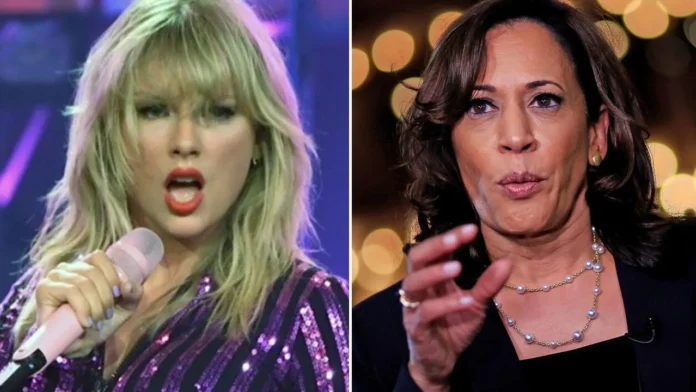In a shocking twist that has left both fans and political commentators reeling, Taylor Swift has been forced to cancel several dates of her wildly successful Eras tour after ticket sales took a nosedive. The culprit? A fierce backlash following Swift’s highly publicized endorsement of Vice President Kamala Harris for the 2024 presidential election.
What was once a surefire hit tour—selling out stadiums in record time—has now seen only 2,300 tickets sold for upcoming shows, an unthinkable low for the pop icon. This sudden drop has caused Swift and her team to make the difficult decision to cancel several of her future tour dates, a move that has only added fuel to the fire in an already divided fandom.
It all started with Swift’s impassioned endorsement of Kamala Harris, which came just weeks ago. Posting on her Instagram, Swift described Harris as “a beacon of hope for women” and the candidate who could “lead America into a brighter, more inclusive future.” Her post went viral instantly, as expected. But what Swift didn’t foresee was the tidal wave of backlash that followed from segments of her fanbase who felt alienated by her political stance.
While Swift has never shied away from using her platform to speak out on social issues, this marked her most direct involvement in a political campaign. And the reaction from some fans was swift—and brutal. Social media erupted with fans denouncing her for mixing politics with pop music, with some even calling for a boycott of her tour.
Swift, known for uniting millions through her music, suddenly found herself at the center of a political storm, where “Swifties” were split down the middle. The backlash quickly spilled over into the most critical aspect of her career: ticket sales.
Swift’s Eras tour, which had been selling out venues in minutes, began to show signs of trouble soon after her Harris endorsement. Fans who had once clamored for tickets were now canceling orders, demanding refunds, or simply refusing to purchase tickets for upcoming shows. The numbers are telling: only 2,300 tickets sold for her next few performances, a stark contrast to the sold-out arenas she’s used to.
For a performer like Swift—who has consistently shattered touring records—such a drop is unprecedented. The drop-off was so severe that Swift and her management team made the painful decision to cancel several future dates on the tour, opting to regroup and figure out how to navigate this political and cultural minefield.
The reaction among her fans has been predictably polarized. While some have rallied behind Swift, praising her for standing up for her beliefs and using her influence for political change, others feel betrayed.
I’ve always loved Taylor, but I just don’t think it’s right to mix politics with entertainment,” said Ashley Perkins, a long-time Swift fan who decided not to attend the tour after the endorsement. “I listen to her music to escape, not to be reminded of the political climate.”
Other fans, however, are doubling down on their support for Swift. “If you’re only a fan when she stays quiet, then you were never really a fan,” tweeted one vocal supporter. “Taylor is standing up for what she believes in, and I respect that.”
This division within her fanbase has led to fierce online debates, where Swifties who once bonded over album releases and concert setlists are now clashing over political opinions. As Swift’s fandom grapples with its own internal struggles, the broader question looms: what does this mean for Swift’s career, both musically and as a cultural figure?
It’s not just ticket sales that are suffering in the wake of Swift’s endorsement. Rumors are swirling that some of Swift’s lucrative brand deals may be in jeopardy. For years, Swift has been one of the most marketable celebrities on the planet, with companies lining up to collaborate with her. But with the divisive nature of her Harris endorsement, some brands are reportedly reconsidering their association with the pop star.
“A lot of brands don’t want to get involved in politics, especially when it’s as polarizing as this,” said one marketing expert. “Even someone as powerful as Taylor Swift isn’t immune to the fallout that comes with aligning yourself too closely with one side.”
While no official announcements have been made, the buzz around possible tensions between Swift and her sponsors is enough to raise eyebrows. In a world where image is everything, Swift’s move to back Harris may have caused ripples she hadn’t anticipated.
As Taylor Swift grapples with the consequences of her endorsement, fans and critics alike are wondering if this is just a temporary setback or the beginning of a longer-term shift in her career. While her Eras tour cancellations are a significant blow, Swift has proven to be remarkably resilient in the past, bouncing back from controversies and personal challenges alike.
Taylor Swift is no stranger to reinvention,” said a prominent music critic. “She’s gone from country sweetheart to pop queen to indie darling. If anyone can recover from this, it’s her. But she’ll have to carefully navigate this politically charged moment.”
One thing is clear: Swift’s move into politics has changed the game, not just for her tour, but for how fans and the public perceive her. Will she choose to double down on her political involvement, or will she find a way to mend the divide within her fandom? Only time will tell.
In her statement announcing the cancellation of her future Eras tour dates, Swift struck a hopeful yet realistic tone: “I’ve always believed in the power of music to bring people together, but right now, I understand that we’re living in incredibly divided times. I’m heartbroken that I won’t be able to see all of you at the shows, but I’ll be back. This isn’t the end.”
For now, Swift seems determined to move forward, but it’s clear that the intersection of politics and pop culture is more complicated than even she might have imagined. Whether Swift’s Eras tour cancellation marks a bump in the road or a turning point in her career remains to be seen.
One thing’s for sure: when Taylor Swift speaks—whether in lyrics or political endorsements—people listen. But now, more than ever, the question is: are they buying tickets?

















